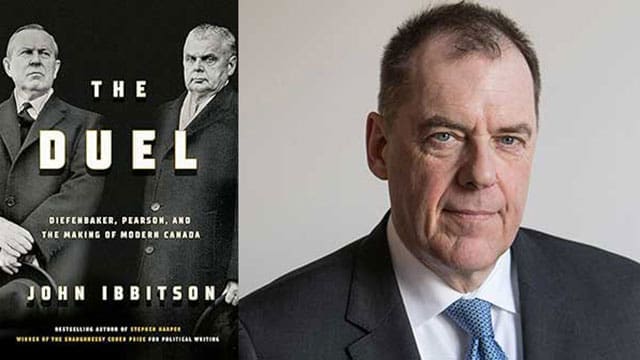A review of John Ibbitson’s The Duel: Diefenbaker, Pearson and the Making of Modern Canada
 If John Diefenbaker and Lester Pearson really did make modern Canada, as John Ibbitson maintains in his double-barred biography The Duel: Diefenbaker, Pearson, and the Making of Modern Canada, we might be justified in asking for our money back.
If John Diefenbaker and Lester Pearson really did make modern Canada, as John Ibbitson maintains in his double-barred biography The Duel: Diefenbaker, Pearson, and the Making of Modern Canada, we might be justified in asking for our money back.
Not for the book: it is a splendid introduction to our 13th and 14th prime ministers as politicians and as men and of their careers and failings. But for their legacy, which Ibbitson hails without addressing our sorry state today.
Diefenbaker and Pearson are giants by Canadian political standards. But unless you are getting on or deeply immersed in Canadian political history – or both – you may well need an introduction to men born in 1895 (“Dief”) and 1897 (“Mike” Pearson).
Both wore a uniform in the First World War, but neither saw combat.
Both occupied 24 Sussex fairly briefly in the middle of the last century, arguably unsuccessfully: the former squandering a majority and the latter never winning one due to significant character defects.
 |
| Related Stories |
| The month John Diefenbaker’s political goose was cooked
|
| How Diefenbaker and Pearson shaped Canada
|
| From Rust to Glory: Prime Minister Pearson’s Buick to be restored
|
Ibbitson deals with those defects deftly, as with his subject matter generally, interweaving the very different stories of Pearson, the consummate insider and Dief, the consummate outsider from childhood, through politics and increasingly bitter rivalry as they approached their collision at the summit, in a relatively brief 414 pages.
But he also argues, persuasively, that they were far more similar on policy than in personality or world-view: “however likeable Mike Pearson may have been and however difficult John Diefenbaker may have been at times – they shared many of the same values, making their governments a continuum of progress toward the Canada we know today.”
His mastery of his material is so comprehensive as to be unobtrusive.
Nothing seems to be omitted or stuffed in as he glides from telling detail to revealing anecdote to memorable line, including a historian explaining Pierre Trudeau’s appeal in the late 1960s beside the general run of paunchy grey-haired, grey-faced cigarette-smoking political hacks as “an action hero in an old folks’ home.”
And the best zinger I’d never heard about the always dubious mental health of “the Chief”, from 1967, that “John Diefenbaker is a madman who thinks he’s John Diefenbaker.”
You also have to love Dief’s 1965 election crack that the Liberal slogan was “throw the bums in.” And Ibbitson’s own jibe that as Diefenbaker was beginning to rise in the Tory party by losing election after election while prospering as a lawyer for underdogs, “He was a successful failure in a party where failure was a fact of life.”
Such gems will help those not familiar with that now-forgotten era grasp its ethos as well as its events. Including the oddity that Diefenbaker, an ethnic outsider in early 20th-century Canadian terms, was a devoted, arguably Romantic defender of the British Empire while Pearson, a comparative insider by comfortable if not elite birth and an absolute insider by temperament and apparently effortless career, took the Union Jack off our flag in one of those controversies that tore friends and families apart but nobody now remembers except as a “Heritage Moment” where foes reconciled to forge modern Canada.
The book does suffer mildly from conventional wisdomitis. There is no topic from Keynesian economics to the Cold War to Quebec’s “Grand Noirceur” prior to the “Quiet Revolution” on which Ibbitson dissents from the Laurentian consensus, as one might expect in a book whose preface begins by thanking Jean Chrétien, Joe Clark and John Baird and ends by praising Kim Campbell’s political wisdom.
He mocks the tale of Canada as born of British liberty and only concedes grudgingly that “Some historians believe this country came of age” at Vimy Ridge. (Interestingly, he states flatly that Alger “Hiss was a spy,” so revelation is apparently now orthodox.)
And in discussing the 1967 Tory revolt that finally dumped Diefenbaker, he claims then PC student federation leader Joe Clark was “smart and ambitious,” which is only half-true.
Ibbitson even calls Canada “a settler society” while discussing indigenous rights. At one point, he claims that “Since Confederation, the unstated purpose of the federal government’s immigration policy had been to keep Canada white”, in support of which he weirdly cites the exclusion of “Jews, Doukhobors and Mennonites.” But the only way this flaw matters significantly is that he suffers the widespread misconception that Canada is governed by giants.
It’s an understandable conceit for the press gallery, elevating their own work from tattling on mediocrities to witnessing history. Thus, Ibbitson rhapsodizes that Peter C. Newman “burst onto the cloistered, incestuous world of the press gallery like a force of nature – a brilliantly talented journalist.
Newman’s portrayal of Diefenbaker in Maclean’s would become the leading narrative of the prime minister and his governments. “That the narrative was flawed, inaccurate, and the product of the author’s own insecurities hardly mattered.”
Yes, it did. This is not to say that Ibbitson overlooks his subjects’ feet of clay. Sometimes the conventional wisdom is right, including Diefenbaker’s borderline insanity and culpably infuriating disorganization that prompted Newman’s classic quip that after winning his 1958 landslide “He gave the people a leadership cult, without leadership.’” Kaboom!
Ibbitson also mercilessly reveals that Pearson was slick, dishonest and capable of nastiness. Including the shocking detail, which I had never realized, that the “Munsinger Affair” between Diefenbaker’s defence minister and an adventuress was not exposed in real-time but revealed by Pearson as prime minister was trying to blackmail the Tories into laying off some grotesque Liberal corruption.
Ibbitson also makes clear that both Pearson and Diefenbaker exited the Great War early and then lied about it. But as a postmodern, he adds, “Both would concoct stories to cover” what really happened and “Over the years, perhaps, those stories became their personal truth,” so we have no right to judge them.
But we do. As we can condemn Dief for saying in his memoirs that he always opposed Japanese internment when he initially supported it.
Ibbitson admits, then glosses over, their failings as family men, including Diefenbaker waiting too long to have children because he was “too busy and too ambitious – and perhaps had too little love to give”.
And he dismisses apparently well-founded rumours of mutual infidelity with: “Although the Pearsons had a successful marriage, they were also cosmopolitan and war upends conventional behaviour.”
What, Hitler made them do it?
He brings down the curtain on his subjects by noting that Trudeau never fully spelled out what “Just Society” meant. But then he adds, “people just seemed to know,” which is not true even of its author. Ibbitson doesn’t mention that it was cribbed from Lyndon Johnson’s “Great Society” three years earlier, as Canadian politicians are trend-setting giants, not mediocre conformists.
While acknowledging that “The sky-high expectations for his Just Society could never be met,” rather than condemning it as hallucinogen-laced snake oil, he maintains that “the apogee of Trudeaumania was wondrous to behold” while disregarding Trudeau’s harmful divisiveness and centralization of power.
These are not trivial failings. Any more than Pearson’s mushy enthusiasm for hard-left “Third World” nationalists can be swept aside by conceding that he “failed to grasp the frailty of democratic institutions … the depth of corruption and nepotism” or “conflicts among ethnic groups” that Ibbitson blames on colonialism as if these places were peaceful and tolerant before the British showed up.
Yet this predilection does not prevent him, in his detailed narrative, from facing disquieting facts, including that despite Canada’s alleged cultural sophistication in the late 1950s, “Most of the homegrown fare on the CBC was awful.”
It is unfortunate, then, that Ibbitson does not mention that modern Canada is broken, instead lavishing praise on all its pillars, including our glorious immigration system.
A major reason he likes and even admires Diefenbaker is that he was left-wing: a big fan of government social programs, against capital punishment, pro-equalization, soft on Chinese communism, pro-socialized medicine and as hostile to free-market economics as he was uninterested in them, a flaw Pearson shared.
Naturally, Ibbitson prefers Pearson. The Epilogue starts with, “The single greatest difference between Lester Bowles Pearson and John George Diefenbaker was in their ability to grow. Pearson could; Diefenbaker couldn’t.”
It’s not clear how Pearson grew from a mediocre professor to a monolingual PM whose own chronic disorganization and cronyism undermined his premiership. In the end, he praises Dief for a quality sadly missing today that Pearson also conspicuously lacked: “a bond that Diefenbaker forged with the people.” He was always on the side of the underdog; he understood the ordinary Canadian left out of the Laurentian charmed inner circle.
These men are not giants. After discussing a kludged-together compromise with Quebec on the CPP/QPP, he says, “This is when Lester B. Pearson became a great prime minister.”
Not exactly Valley Forge, is it?
But Ibbitson concludes with a characteristically telling and frank anecdote about his own mother and grandmother being heartbroken when Dief was toppled by his party in 1967. He writes: “The powerful may have despised him, but common folk loved him. And he never betrayed that love.”
A quality we can only wish had made modern Canada.
John Robson is a senior fellow at the Aristotle Foundation for Public Policy, an adjunct professor at Augustine College, and an author, historian, columnist and documentary filmmaker.
For interview requests, click here.
The opinions expressed by our columnists and contributors are theirs alone and do not inherently or expressly reflect the views of our publication.
© Troy Media
Troy Media is an editorial content provider to media outlets and its own hosted community news outlets across Canada.

